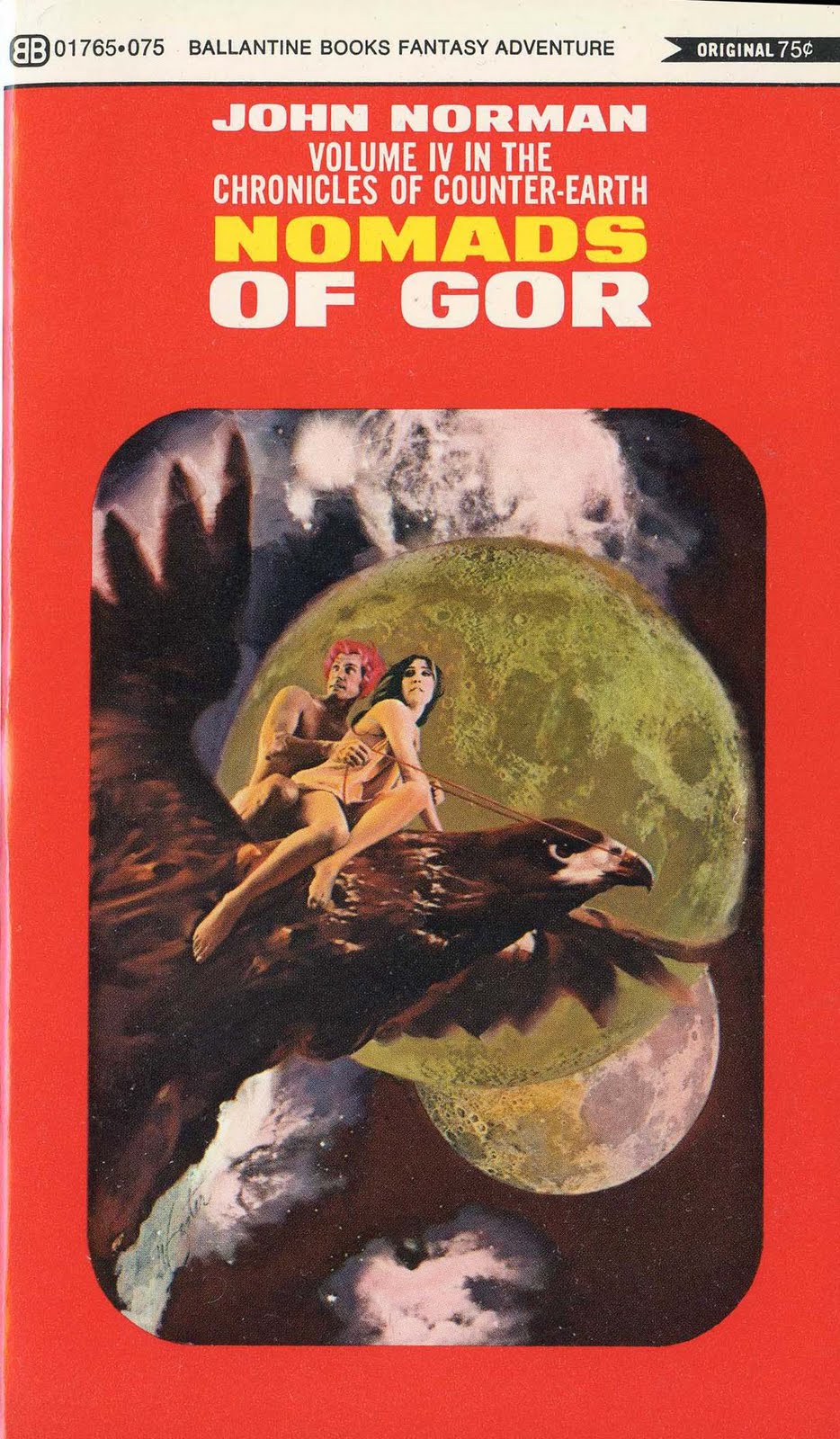Deel vier, en ik vroeg mij af hoe het verder zou gaan na zo’n totale paradigm shift als in Priest-Kings of Gor, waar iets dat 100% min of meer standaardfantasy leek te zijn, plots met aliens en alles is.
Wel: er was een probleem met het nest van de priesterkoningen, en de koningin is dood, en dus moest Tarl Cabot op zoek naar een ei, dat bij die nomaden zou zijn.
En dat is dus wat hij doet in dit boek: op zoek gaan naar een ei bij de nomaden. Die helemaal anders van maatschappij zijn als de andere mensen op Gor. Natuurlijk nog altijd vrouwonvriendelijk en zo, maar toch ook helemaa een eigen manier van de dingen organiseren.
Uiteraard is Tarl ongelooflijk goed en slaagt hij er meteen in om het vertrouwen te winnen van één van de belangrijkste mannen van de enorme groep nomaden, en integreert hij zich meteen ook goed en alles. Er komt ook zowaar een nieuwe persoon van de Aarde in de buurt: Elizabeth Cardwell, een secretaresse uit New York die naar een jobinterview op weg was, en wakker werd op Gor.
Uiteraard dat ze een slavin wordt, uiteraard dat ze verliefd wordt op Tarl en beseft dat het veel veel beter is voor haar in het algemeen om een slavin te zijn met een degelijke meester.
Maar hey, gegeven het genre en de reeks en de verwachtingen: geen slecht boek. Ik heb me geen moment verveeld.
Misschien is dat ook wel omdat ik kan genieten van worldbuilding for the sake of worldbuilding. Heeft hij het over de Wagon Peoples en hun tijdsberekening, dan wordt dat meteen een hele uitleg:
The Wagon Peoples war among themselves, but once in every two hands of years, there is a time of gathering of the peoples, and this, I had learned, was that time. In the thinking of the Wagon Peoples it is called the Omen Year, though the Omen Year is actually a season, rather than a year, which occupies a part of two of their regular years, for the Wagon Peoples calculate the year from the Season of Snows to the Season of Snows; Turians, incidentally, figure the year from summer solstice to summer solstice; Goreans generally, on the other hand, figure the year from vernal equinox to vernal equinox, their new year beginning, like nature’s, with the spring; the Omen Year, or season, lasts several months, and consists of three phases, called the Passing of Turia, which takes place in the fall; the Wintering, which takes place north of Turia and commonly south of the Cartius, the equator of course lying to the north in this hemisphere; and the Return to Turia, in the spring, or, as the Wagon Peoples say, in the Season of Little Grass. It is near Turia, in the spring, that the Omen Year is completed, when the omens are taken usually over several days by hundreds of haruspexes, mostly readers of bosk blood and verr livers, to determine if they are favourable for a choosing of a Ubar San, a One Ubar, a Ubar who would be High Ubar, a Ubar of all the Wagons, a Ubar of all the Peoples, one who could lead them as one people.*
Oh, en dat sterretje op het einde is inderdaad een voetnoot, waar dan nog eens uitgebreid wordt:
A consequence of the chronological conventions of the Wagon Peoples, of course, is that their years tend to vary in length, but this fact, which might bother us, does not bother them, any more than the fact that some men and some animals live longer than others; the women of the Wagon Peoples, incidentally, keep a calendar based on the phases of Gor’s largest moon, but this is a calendar of fifteen moons, named for the fifteen varieties of bosk, and functions independently of the tallying of years by snows; for example, the Moon of the Brown Bosk may at one time occur in the winter, at another time, years later, in the summer; this calendar is kept by a set of coloured pegs set in the sides of some wagons, on one of which, depending on the moon, a round, wooden plate bearing the image of a bosk is fixed. The years, incidentally, are not numbered by the Wagon Peoples, but given names, toward their end, based on something or other which has occurred to distinguish the year. The year names are kept in living memory by the Year Keepers, some of whom can recall the names of several thousand consecutive years. The Wagon Peoples do not trust important matters, such as year names, to paper or parchment, subject to theft, insect and rodent damage, deterioration, etc. Most of those of the Wagon Peoples have excellent memories, trained from birth. Few can read, though some can, perhaps having acquired the skill far from the wagons, perhaps from merchants or tradesmen. The Wagon Peoples, as might be expected, have a large and complex oral literature. This is kept by and occasionally, in parts, recited by the Camp Singers. They do not have castes, as Goreans tend to think of them. For example, every male of the Wagon Peoples is expected to be a warrior, to be able to ride, to be able to hunt, to care for the bosk, and so on. When I speak of Year Keepers and Singers it must be understood that these are not, for the Wagon Peoples, castes, but more like roles, subsidiary to their main functions, which are those of the war, herding and the hunt. They do have, however, certain clans, not castes, which specialize in certain matters, for example, the clan of healers, leather workers, salt hunters, and so on. I have already mentioned the clan of torturers. The members of these clans, however, like the Year Keepers and Singers, are all expected, first and foremost, to be, as it is said, of the wagons namely to follow, tend and protect the bosk, to be superb in the saddle, and to be skilled with the weapons of both the hunt and war.
Het vrouwonvriendelijke aspect dan: Tarl Cabot wordt meer en meer een echt Goreaan. Dit is een typische interactie met Elizabeth — die, ter herinnering, iemand is van zijn eigen planeet:
“You are free,” I said firmly.
“I shall try to keep it in mind,” she said.
“Do so,” I said.
“Do I make you nervous?” she asked.
“Yes,” I said.
She had now picked up the yellow sheet and, with a pin or two, booty from Turia probably, fastened it gracefully about her. I considered raping her. It would not do, of course.
“Have you eaten?” she asked.
“Yes,” I said.
“There is some roast bosk left,” she said. “It is cold. It would be a bother to warm it up, so I will not do so. I am not a slave girl, you know.”
I began to regret my decision in freeing her.
Her eyes were looking at me over the rim of her bowl as she drank. “It is said,” she remarked, her eyes mischievous, “that any man who frees a slave girl is a fool.”
“It is probably true,” I said.
“You are nice, Tarl Cabot,” she said.
She seemed to me very beautiful. Again I considered raping her, but now that she was free, no longer a simple slave, I supposed that it would be improper. I did, however, measure the distance between us, an experiment in speculation, and decided I could reach her in one bound and in one motion, with luck, land her on the rug.
Ahem ja.


Reacties
Eén reactie op “Gor #4: Nomads of Gor”
[…] — Elisabeth uit het vorige boek — doet zich voor als een Goreaanse slavin en werkt van binnenuit, terwijl Tarl zich als een […]